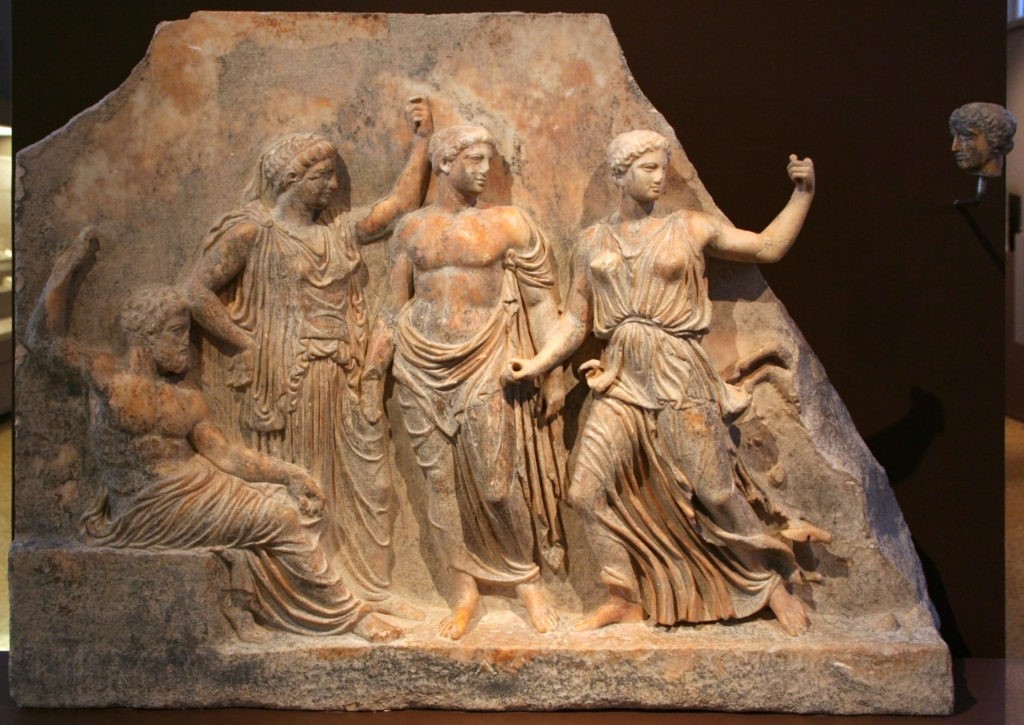A relief showing Zeus and Leto with their offspring Apollo and Artemis to the right. 420-410 BCE. (Archaeological Museum of Brauron, Greece)
– Rev José Mario O Mandía
Man’s nature makes him a rational and a social being. Does it likewise make him a religious being?
If we were to go around the world and explore its remotest parts, we would probably find that each culture has some form of religious belief. The religious phenomenon is found wherever there are human beings. This is a fact that philosophy also studies. Indeed, man is the only being capable of religion; he is the only being on earth who yearns for something greater and who believes in some deity.
Where does this yearning and belief come from? Man’s will and his intellect. His will, despite attaining certain goods, always longs for more. His intellect makes him capable of reaching beyond the visible world – it makes him open to what is infinite.
Anthropologists and ethnologists acknowledge the existence of religion. Likewise, philosophers and theologians. Aristotle (384-322 BC) taught: “All men are convinced that the gods exist.” Clement of Alexandria (150-211/215 AD) said, “There is no group of farmers, nomads or citizens who can live without having faith in a superior being.” Henri Bergson (1851-1941) asserted, “In the past, there have existed human societies without science, art or philosophy. But there has been no society without religion.”
All religion is the acknowledgement of something or Someone greater than man. English Catholic historian Christopher Dawson (1889-1970), wrote in his book on Religion and Culture: “What then is the specific nature of the religious phenomenon? All religion is based on the recognition of a superhuman Reality of which man is somehow conscious and towards which he must in some way orientate his life. The existence of the tremendous transcendent reality that we name GOD is the foundation of all religion in all ages and among all peoples.”
In 6th century BC, universal religions start appearing. The religions of the Far East, especially Hinduism and Buddhism, believed that the divine is absolute reality with which man should identify himself and in which he would dissolve himself after a period of purification. The religions of the Near East (which also spread in the West, like Judaism, Christianity, and Islam) believe in God to whom they can relate through dialogue, covenant, love or obedience.
A careful observation of religions shows us that they have a few basic features. (1) The first is a creed which explains not only what or who the deity is, but the place that man and the world occupy. (2) Then there is a cult or worship which includes prayers and rites. (3) Finally there is a moral code which lays down the norms of behavior.
When we study the influence of religion in society through the centuries, we will discover the many benefits it has brought.
“Religion in its highest forms has exercised a profound influence on the development of human culture. In the recognized sphere of morality, it has offered powerful motives to right conduct; it has been the chief inspiration of music, poetry, architecture, sculpture, and painting; it has been the dominant influence in the formation of a permanent literature. In all the early civilizations, the chief representatives and transmitters of the highest known culture have been the officials in charge of religious rites. Religion has been a mighty force in the life of nations, cultivating in the hearts of men a striving for better things, a healthy tone of cheerfulness, hope, joy, resignation under calamities, perseverance in the face of difficulties, a readiness for generous service, in short a spirit of high-minded optimism, without which no nation can rise to greatness” (Aiken, C.F. “Religion,” in The Catholic Encyclopedia, http://www.newadvent.org/cathen/12738a.htm)
But hasn’t religion caused many wars?
We will get to that question next time.


 Follow
Follow


